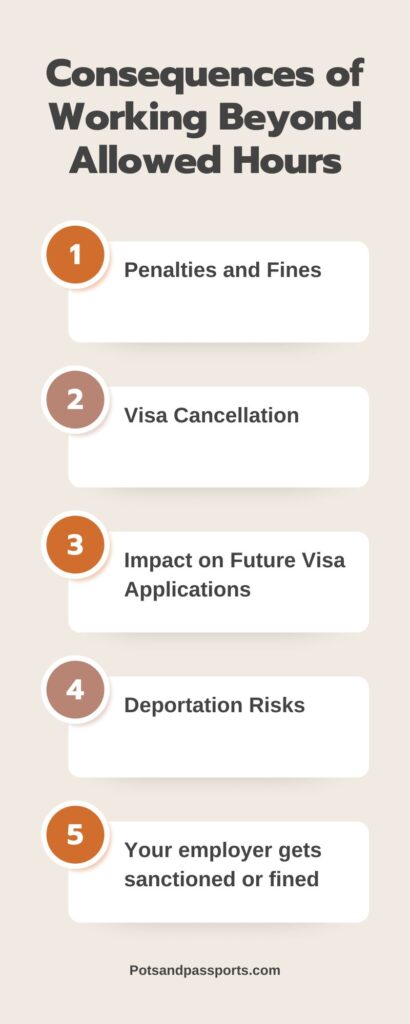
Working in the UK on a Student Visa: What You Need to Know in (2024)
Table of Contents
Studying in the United Kingdom offers a rich academic and cultural experience, attracting thousands of international students each year. According to records, 450,000 student visas were issued in the past year alone. Beyond academics, many students seek part-time employment to gain work experience, support themselves financially, or simply immerse themselves further into British life. If you are an international student on a student visa in the UK, understanding the rules and opportunities surrounding employment is crucial. This article provides an in-depth guide to working in the UK on a student visa, ensuring you stay informed and compliant.

Understanding Your Student Visa Conditions

Working Hours and Restrictions
The UK student visa, typically a Tier 4 (General) student visa, imposes specific conditions on the amount and type of work you can undertake. Key restrictions include:
- Term-time Work Limits: Most international students can work up to 20 hours per week during term time if they are studying at degree level or above. For those studying below degree level, the limit is often 10 hours per week.
- Holiday Work Limits: During official vacation periods, students are allowed to work full-time. This includes summer holidays and breaks between terms.
- Type of Work: Students are generally prohibited from engaging in self-employment, starting a business, working as a professional sportsperson or entertainer, or taking on a permanent full-time role.
Checking Your Visa
It is essential to verify the specific conditions attached to your visa. These conditions are usually stated on your Biometric Residence Permit (BRP) or the visa vignette in your passport. Ensure you understand these conditions to avoid any breaches, which can have serious consequences, including revocation of your visa.
Finding Work: Tips and Resources
University Career Services
Most UK universities have dedicated career services departments that can assist you in finding part-time employment. These services often include job listings, CV writing workshops, and interview preparation sessions. Engaging with your university’s career services is an excellent first step in your job search.
Job Portals and Recruitment Agencies

Several online job portals cater specifically to students seeking part-time work. Popular platforms include:
- Indeed: A broad job search engine that lists part-time and temporary positions.
- StudentJob: Specializes in student employment, including part-time, internships, and holiday jobs.
- E4S (Employment 4 Students): Offers a variety of job listings tailored to students.
Additionally, recruitment agencies can help match you with suitable part-time roles. Agencies like Reed, Adecco, and Manpower often have temporary and flexible work options.
Networking
Networking can significantly enhance your job search. Attend university events, career fairs, and industry meet-ups to connect with potential employers and gain insights into job opportunities. Leveraging platforms like LinkedIn to connect with professionals in your field can also open doors to part-time work opportunities.
Types of Work Suitable for Students

On-Campus Jobs
Many universities offer on-campus job opportunities, which can be a convenient option for students. These roles might include working in the university library, student union, administrative offices, or campus cafes. On-campus jobs are not only convenient but also tend to be understanding of your academic commitments.
Retail and Hospitality
The retail and hospitality sectors are among the most common industries for student employment. Jobs in shops, restaurants, cafes, and bars often offer flexible hours that can fit around your study schedule. Additionally, these roles can provide valuable customer service and teamwork experience.
Internships and Work Placements
While internships and work placements are more common during the summer or as part of your course requirements, they are worth considering. Some internships are part-time and can provide industry-specific experience that enhances your employability post-graduation.
Balancing Work and Studies

Time Management
Balancing work and studies requires effective time management. Create a schedule that prioritizes your academic responsibilities while allocating specific times for work. Utilize tools like calendars and task management apps to keep track of deadlines and shifts.
Academic Priorities
Remember that your primary purpose in the UK is to study. Ensure that your work commitments do not interfere with your academic performance. If you find that working part-time is negatively impacting your studies, consider reducing your hours or seeking support from your university’s student services.
Financial Considerations
National Insurance Number
To work in the UK, you need a National Insurance (NI) number. This number is used to track your tax and National Insurance contributions. You can apply for an NI number through the UK government website. It’s advisable to apply as soon as you have a job offer, as processing can take several weeks.
Understanding Your Pay
Be aware of the National Minimum Wage, which varies depending on your age. As of July 2024, the rates are:
- £11.44 per hour for those aged 21-22
- £8.60 per hour for those aged 18-20
- £6.40 per hour for those under 18
Ensure you receive at least the minimum wage for your age group and understand your rights regarding payslips and deductions.
Tax Implications

International students are subject to UK tax regulations. However, if your total income is below the personal allowance (currently £12,570 per year), you may not need to pay income tax. Ensure you keep track of your earnings and fill out necessary tax forms, such as the P45 and P60, provided by your employer.
Legal and Compliance Matters
Right-to-Work Checks
Employers in the UK are required to conduct right-to-work checks before hiring you. This involves verifying your visa and eligibility to work. Ensure you provide the necessary documentation, such as your BRP, visa vignette, and passport.
Avoiding Illegal Work
Engaging in work that is not permitted by your visa conditions can have severe consequences, including visa cancellation and deportation. Always adhere to the permitted hours and types of work as specified on your visa.
Reporting Changes
If there are any significant changes to your circumstances, such as a change in your course of study or if you decide to leave your course, you must inform the Home Office. Failure to do so can affect your visa status and your right to work.
Post-Study Work Opportunities
Graduate Route Visa
Upon completing your degree, you may be eligible for the Graduate Route visa, which allows you to stay in the UK for up to two years (or three years for PhD graduates) to work or look for work. This visa does not restrict the type of work you can undertake, providing an excellent opportunity to gain further experience in your field.
Sponsorship for Skilled Workers
If you secure a job offer from a licensed sponsor after graduation, you may be eligible to switch to a Skilled Worker visa. This visa allows you to stay in the UK to do a job with an approved employer and is an excellent pathway to longer-term employment.
Further Studies
Some students choose to continue their education in the UK by enrolling in postgraduate programs. Continuing your studies can extend your student visa, allowing you to work part-time under similar conditions as before.
Tips for a Successful Work Experience

Enhancing Your CV
Work experience in the UK can significantly enhance your CV. Highlight your part-time roles, internships, and any relevant skills or achievements. Tailor your CV to the job you are applying for and include a concise personal statement that reflects your career aspirations.
Building Soft Skills
Part-time work offers an excellent opportunity to build soft skills such as communication, teamwork, time management, and problem-solving. These skills are highly valued by employers and can enhance your employability across various industries.
Seeking Support
If you encounter any issues related to your employment, such as workplace disputes, unfair treatment, or concerns about your rights, seek support from your university’s student services or organizations like Citizens Advice. These resources can provide guidance and support to help you navigate any challenges.
Frequently Asked Questions about UK Student Visa
Does a UK student visa allow you to work?
Yes, a UK student visa allows you to work under certain conditions. Full-time students enrolled in a degree-level course at a recognized institution can work up to 20 hours per week during term time and full-time during holidays. If you are studying a course below degree level, you are typically allowed to work up to 10 hours per week. These work rights are designed to help students support themselves financially while studying. However, it’s essential to comply with all UK Visas and Immigration (UKVI) regulations regarding employment to avoid jeopardizing your visa status. Always check the specific conditions attached to your visa.
What happens if I work over 20 hours on a student visa in the UK?
If you work over 20 hours per week on a student visa in the UK during term time, you violate the conditions of your visa. This can lead to serious consequences, including termination of your visa and possible deportation. Your educational institution is required to report any breaches to UK Visas and Immigration (UKVI). Such violations can also negatively impact future visa applications, as they demonstrate non-compliance with UK immigration rules. To avoid these issues, strictly adhere to the 20-hour work limit during term time and fully understand and follow the employment regulations outlined in your visa conditions.
Can I convert my student visa to a work visa in the UK?
Yes, you can convert your student visa to a work visa in the UK, provided you meet certain criteria. After completing your degree, you may be eligible to switch to a Tier 2 (General) work visa if you have a job offer from a licensed sponsor that meets the salary and skill requirements. Alternatively, you can apply for the Graduate Route, which allows you to stay and work, or look for work, in the UK for up to two years (or three years for doctoral graduates).
How much you can earn on a student visa in the UK?
Earnings on a student visa in the UK depend on the hours worked and the type of employment. As of 2024, the National Minimum Wage is £11.44 per hour. Degree-level students can work up to 20 hours per week during term time and full-time during holidays, while students on courses below degree level can work up to 10 hours per week. Therefore, a student working a maximum of 20 hours per week could earn up to £228.80 per week.
How long can you stay in the UK after your student visa expires?
After your student visa expires, you must leave the UK unless you have applied for a visa extension or switched to a different visa category. Typically, there is no grace period, and overstaying your visa can have serious consequences, including a ban on re-entering the UK for a certain period. If you wish to stay longer, you must apply for a new visa before your current one expires. Options include switching to a work visa, such as a Tier 2 (General) visa if you have a job offer, or applying for the Graduate Route, which allows you to stay and work in the UK for up to two years (three years for doctoral graduates). Always ensure your visa application is submitted on time to maintain your legal status in the UK. Consulting an immigration advisor can help you navigate the process and explore your options for staying in the UK legally.
Can students work 40 hours in the UK?
Students in the UK on a Tier 4 or Student visa are generally allowed to work up to 20 hours per week during term time. However, they can work full-time, up to 40 hours per week or more, during official vacation periods. This rule ensures that students focus on their studies during the academic term while having the opportunity to earn more during breaks. It is crucial to comply with these regulations, as exceeding the permitted work hours can lead to serious consequences, including termination of the visa and potential deportation. Violations can also negatively impact future visa applications. To avoid such issues, students should keep track of their work hours and understand the specific terms of their visa. For detailed and personalized advice, consulting an immigration advisor or the international student office at your institution is recommended.
Why are international graduates not getting jobs in the UK?
International graduates in the UK may face several challenges in securing employment. Key reasons include:
- Visa Restrictions: Many employers hesitate to sponsor work visas due to the complexities and costs involved.
- Lack of Experience: Employers often seek candidates with relevant work experience in the UK, which international graduates may lack.
- Skill Gaps: There may be a mismatch between the skills graduates possess and those in demand by employers.
- Cultural and Communication Barriers: Adapting to the professional and workplace culture in the UK can be challenging.
- Competitive Job Market: The job market is highly competitive, with many candidates vying for the same positions.
To improve job prospects, focus on gaining relevant work experience through internships and part-time jobs, enhancing your professional network, improving language and communication skills, and researching companies that actively sponsor work visas. Consulting career services at your university and seeking advice from alumni can also be beneficial.
What is the minimum wage for international students in the UK?
As of 2024, the minimum wage for international students in the UK is £11.44 per hour. This rate applies to all workers aged 23 and over, including international students. If you are under 23, the minimum wage is slightly lower and varies depending on your age. For instance, workers aged 21-22 earn £10.18 per hour, while those aged 18-20 earn £7.49 per hour. It’s important to note that these rates are subject to change, so always check the latest information from official sources.
As an international student, you can work up to 20 hours per week during term time and full-time during official university holidays. Adhering to these work hour limits is crucial to maintaining your visa status. Working within these regulations allows you to gain valuable work experience, supplement your income, and enhance your employability after graduation. Always ensure your employer complies with UK labor laws regarding wage rates.
How long can international students stay in the UK after graduation?
After graduation, international students can stay in the UK by applying for the Graduate Route visa, which allows them to remain in the country for up to two years. Doctoral graduates can stay for up to three years. This visa enables graduates to work, look for work, or start their own business without needing a sponsor. The application for the Graduate Route must be submitted before your current student visa expires, and you must have completed an eligible course at a recognized UK institution.
During this period, you can gain valuable work experience, which may enhance your prospects of securing a longer-term work visa, such as the Skilled Worker visa. It is crucial to comply with all visa regulations and keep track of deadlines to ensure a smooth transition. For personalized advice and support, consider consulting your university’s international student office or an immigration advisor. This proactive approach can help maximize your post-graduation opportunities in the UK.
How many months are international students allowed to study in the UK as visitors?
International students can study in the UK as visitors for up to six months. This is typically under the Standard Visitor visa, which allows for short-term study courses, such as English language programs or short professional courses. The six-month period provides flexibility for students who wish to gain international experience without committing to a long-term course. However, it’s important to note that this visa does not permit full-time study at degree level or above, nor does it allow work or internships.
If you plan to undertake a longer course, you will need to apply for a Student visa, which has different requirements and permits longer stays based on the duration of your course. Always ensure that you adhere to the conditions of your visa to avoid any issues with UK Visas and Immigration (UKVI). For specific guidance, consult your prospective institution or an immigration advisor to ensure you choose the correct visa for your study plans.
Which part-time job is best for students in the UK?
The best part-time job for students in the UK depends on individual skills, schedules, and career goals. Common options include:
- Retail Assistant: Flexible hours and opportunities for customer service experience.
- Hospitality Roles: Work in restaurants, cafes, or bars, offering flexible shifts and tips.
- Tutoring: Use your academic strengths to tutor school or fellow university students.
- Administrative Jobs: Campus-based roles that align with your academic schedule.
- Internships: Part-time internships related to your field of study provide valuable experience and networking opportunities.
When choosing a part-time job, consider the balance between work and study. Ensure that the job does not exceed the 20-hour per week limit during term time set by UK Visas and Immigration (UKVI) for student visa holders. Prioritize roles that enhance your skills and experience, which can be beneficial for your future career. Always verify that the employer complies with UK labor laws and pays at least the minimum wage. However, there are certain jobs international students are prohibited from doing and we have dedicated this post to addressing your concerns.
Is it easy to find a job in the UK as an international student?
Finding a job in the UK as an international student can be challenging but manageable with the right approach. Key factors include understanding visa regulations, such as the 20-hour work limit during term time, and focusing on sectors with high demand for part-time workers, like retail, hospitality, and administration.
Networking plays a crucial role; utilize university career services, job fairs, and online platforms like LinkedIn. Tailoring your CV to highlight relevant skills and experiences can make you stand out. Additionally, gaining UK work experience through internships or volunteering can enhance your employability.
It’s essential to be proactive and persistent. While competition can be intense, many international students successfully secure part-time jobs by leveraging university resources and actively engaging with potential employers. Balancing work and studies is vital to maintaining academic performance and complying with visa conditions. With determination and strategic planning, you can find suitable employment opportunities in the UK.
What is the highest-paid part-time job in the UK?
International students in the UK on a Student visa are not allowed to engage in freelance work or own businesses. They can work part-time up to 20 hours per week during term time and full-time during vacations, provided they follow specific employment guidelines.
High-paying part-time jobs that align with these restrictions include:
- Tutoring: Offering private tuition in subjects you excel at can be financially rewarding, often paying between £20 to £40 per hour.
- University Ambassador: Roles such as campus tour guides or event staff can pay well and provide networking opportunities.
- Research Assistant: Assisting professors or departments with research projects can be well-paid and academically enriching.
- Retail and Hospitality: Management or supervisory roles in these sectors often pay more than entry-level positions.
To maximize your earnings, focus on developing in-demand skills and gaining experience relevant to high-paying roles. Always ensure your employment complies with UK Visas and Immigration (UKVI) regulations to maintain your legal status.
Which job is best for students in the UK?
The best job for students in the UK balances flexibility, skill development, and income. Popular options include:
- Tutoring: Offers high pay and flexible hours. You can tutor schoolchildren or fellow university students in subjects you excel at, enhancing your teaching and communication skills.
- University Ambassador: Roles like campus tour guides or event staff provide flexible schedules and the opportunity to network, improving your public speaking and organizational skills.
- Retail and Hospitality: These jobs offer part-time shifts that can fit around your academic schedule. Working in customer service roles can develop your interpersonal and problem-solving skills.
- Research Assistant: Ideal for postgraduate students, this role can be financially rewarding and provide valuable academic experience.
- Administrative Jobs: On-campus administrative roles offer convenience and flexibility, allowing you to gain professional experience in a supportive environment.
Choose a job that aligns with your career goals, interests, and academic schedule to ensure a productive and balanced student life. Always comply with UK Visas and Immigration (UKVI) regulations to maintain your legal status.
Conclusion
Working in the UK on a student visa can be a rewarding experience, offering financial support, valuable work experience, and a deeper integration into British culture. However, it is essential to understand and comply with the regulations surrounding your visa to ensure a smooth and successful stay. By utilizing university resources, managing your time effectively, and staying informed about your rights and responsibilities, you can make the most of your time in the UK and lay a solid foundation for your future career.
Post Disclaimer
The information provided on this blog is for general informational purposes only. It is not intended as legal advice or immigration guidance. We strive to keep the information accurate and up-to-date, but we cannot guarantee that all information provided is error-free or current. Immigration laws and procedures can change frequently and vary by jurisdiction.
It is recommended to consult with a qualified immigration lawyer or professional for advice specific to your situation.



